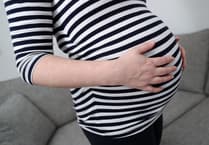PROSTHETIC artists from the Harry Potter films have created a series of three-dimensional educational livers, which have been donated to Royal Surrey County Hospital.
The three life-like organs, which show the progression of liver disease, were delivered to the trust to mark Alcohol Awareness Week (November 14-20).
The made-to-scale prosthetics feature a healthy, a fatty and a cirrhotic liver and will be used by the trust’s alcohol liaison service to help illustrate the effect a patient’s drinking could be having on their body.
They were created by PS Composites and are part of the Drink Informed Kit, which was donated to the hospital by Insides Out, health education products company.
The kit also includes other tools to encourage patients to think about their drinking and the effect that it may have on all systems of the body.
Amelia Middlemiss from Wessex Academic Health Science Network and director of Insides Out said: “The aim of the Drink Informed Kit is to empower and support clinical staff to educate and engage those individuals whose drinking habits are causing them harm.
“It aims to support the patient to make healthier informed choices about their care and encourage positive changes towards healthier lifestyles.”
Michelle Gallagher, clinical director for medicine and clinical lead for hepatology gastroenterology, at the Guildford hospital said: “Regular heavy alcohol consumption can have a detrimental effect on your health. Patients often have no idea what is going on inside their bodies as outwardly they cannot see the damage they are doing.
“The 3D livers are visually very powerful and will help us to illustrate the progression of the disease to patients presenting with hazardous alcohol consumption or in the early stages of the condition where changing behaviours can halt the development to advanced liver disease.”
Royal Surrey’s alcohol liaison service was launched in September 2014 and provides a non-judgmental service for patients admitted with alcohol-related problems. Within its first 12 months, the service saw 1,472 people ranging from 13 to 102 years of age.


.png?width=209&height=140&crop=209:145,smart&quality=75)


Comments
This article has no comments yet. Be the first to leave a comment.